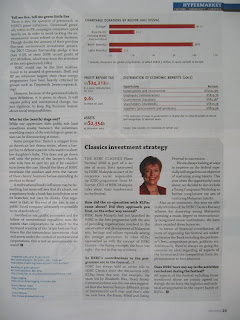From "stealing secrets" to "no secret". Honestly... .
Anyway, my point is that the secret to
The Secret is really no secret at all.
The Secret rebrands and emphasises the power of positive thinking, and says that's all anyone needs. What kind of secret is that? And then these guys come in and say
The Secret is not the secret everyone's looking for, but there is a secret, and that's the secret they've got and knew all along. They also claim that
The Secret secretly subverts its adherents into going against
their secret, while promoting laziness and wishful thinking. So the only way out is to embrace their secret, a beautiful mystery that's not really secretive at all - just mysterious.
In
Kung Fu Panda, the secret is not really a secret at all, either.
No secret here
first published in
The Star, 18 July 2008
Blissfully drowning in my sorrows for the past year or so, I was unaware of the phenomenon that is
The Secret. At one glimpse of the cover, my tired mind registered, "Not another novel..." It wasn't until I got my hands on another book that I found out I was totally wrong.
Through
The Secret (originally a film, which was then developed into a book), Aussie TV writer and producer Rhonda Byrne explores the New Age concept called the Law of Attraction, which says that people can control their lives by the power of their own thoughts and emotions - in short: think (hard), and you will receive.
Wow, and all this time I called it "wishful thinking". What
The Secret claims, however, is that it works. It's no wonder then that certain quarters are behaving like hungry lions watching a zebra herd. Just as with
The DaVinci Code, numerous detractors published works countering
The Secret. One of these is
The Secret Revealed.
Had I taken a much closer look at the cover, I probably would have given it a miss and spared myself some pain. Why, you ask? Previously, James L. Garlow (who's also a pastor) had written another book,
Cracking Da Vinci's Code. I remember the firestorm surrounding that one - the Jesus/Mary Magdalene hoo-ha that so terrified the Vatican and devout Christians everywhere that some form of rebuttal had to be made or the religion would collapse (
The DaVinci Code is still listed under "Fiction", by the way).
Fearing a similar crisis of faith following the release of The Secret, the pastor once again whipped out his crusading pen. Predictably, the authors hit the ground running, underlining the fact that Bible passages are used to sell
The Secret's glaringly un-Christian concepts. The preaching slowly intensifies from there until the end of the book, where it is implied that there is no secret at all - it's about "beautiful mysteries", and its source is God.
While they admit that there may have been good intentions involved, the authors of
The Secret Revealed make no secret of their scorn for Byrne and others who aggressively promote
The Secret. They say the Law of Attraction blames the victims for all their woes, while at the same time, appealing to the get-what-you-want-now mindset of the selfish, greedy and lazy.
They also pan the "deliberate" omissions of concepts like God and sin, and the notion that anybody can "will" whatever they want into being is practically blasphemous. They stress the futility of "transmitting your thoughts towards the Universe", when you could direct them to God instead (personally, I don't see the difference).
Sometimes the authors come off as snide, condescending even, when presenting scenarios where the Law of Attraction fails, as well as in the accompanying arguments.
Of course, they do point out that it's not all bad. They applaud Byrne's exhortations to do good and bring joy to others. They just don't like how she's telling people to go about it.
The Secret Revealed puts forth valid points against swallowing any hype in its entirety, but the Christian-leaning slant in the arguments were a big put-off, as is the assumption that without any help, devout followers of
The Secret are like lemmings who will eventually march off a cliff towards certain doom (they don't say you're going to Hell if you follow
The Secret, just that you might be headed for "trouble").
While flipping the pages I have to remind myself a few times that history is full of stories about weirdo farms and their shepherds, like Jim Jones of the People's Temple, and David Koresh's gun-toting Branch Davidians, so I guess some of the authors' fears are justified. Still, being inadvertently accused of wilful stupidity not only gets my goat, but the whole farm as well.
I won't doubt that
The Secret Revealed does in fact fill in the blanks, but not all of them, and certainly not in the way that I would find comfortable. A more secular point of view would have been more convincing, and less cringe-worthy to my psyche.
Yes, my aversion to religious preaching did taint this review. No, I will offer no apologies for that. I will give some praise to the good pastor and his buddy for their efforts, with a gentle reminder that back then, as now, too much honesty is not always a good thing.
The Secret Revealed
Exposing the Truth About the Law of Attraction
James L. Garlow and Rick Marschall
FaithWords
282 pages
Non-Fiction
ISBN: 978-0-446-19796-0















